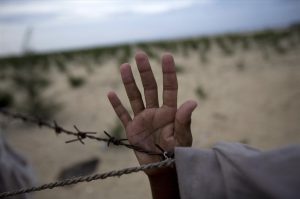F for Faith
To have faith, it is… to believe, you will say.
Of course… but still?
It is to accept a set of propositions on a given topic.
You are right but… only this?
 A short text of the gospel reveals more:
A short text of the gospel reveals more:
“As Jesus went on from there, two blind men followed him, calling out,
‘Have mercy on us, Son of David!’
When he had gone indoors, the blind men came to him, and he asked them,
‘Do you believe that I am able to do this?’
‘Yes, Lord,’ they replied.
Then he touched their eyes and said, ‘According to your faith let it be done to you’;
and their sight was restored” (Matthew 9:27-30).
Jesus’ question was clear: ‘Do you believe that I am able to do this?’
The two blindmen did not proclaim their faith in some formulas.
They did not accept a list of beliefs which they should give their assent to.
They simply replied “Yes” to someone.
They relied on someone – this is faith – to trust someone reliable!
To dare to rely on someone, to dare to surrender to… God.
He who, since long ago, has told us through the prophet Isaiah:
“You are precious in my sight… I love you” (Isaiah 43:4).
A conviction which opens up to a relationship absolutely unique… with God himself.
Daring… to believe it…
Source: Image: https://goodnewsshared.wordpress.com/

 The words of Jesus cannot be misinterpreted (Matthew 5:43-45).
The words of Jesus cannot be misinterpreted (Matthew 5:43-45). We imagine them listening to Jesus and following him on the roads where he walks.
We imagine them listening to Jesus and following him on the roads where he walks. It is then that the gospel text of Mark comes to our rescue:
It is then that the gospel text of Mark comes to our rescue:  And, as if God was aware that we need signs, he gave us a clear sign of his commitment: the rainbow.
And, as if God was aware that we need signs, he gave us a clear sign of his commitment: the rainbow. It is here that the words of Jesus reach us and challenge us:
It is here that the words of Jesus reach us and challenge us: A for ABUNDANCE
A for ABUNDANCE

 Radio: A century informing, entertaining and educating
Radio: A century informing, entertaining and educating End Violence Against Children
End Violence Against Children